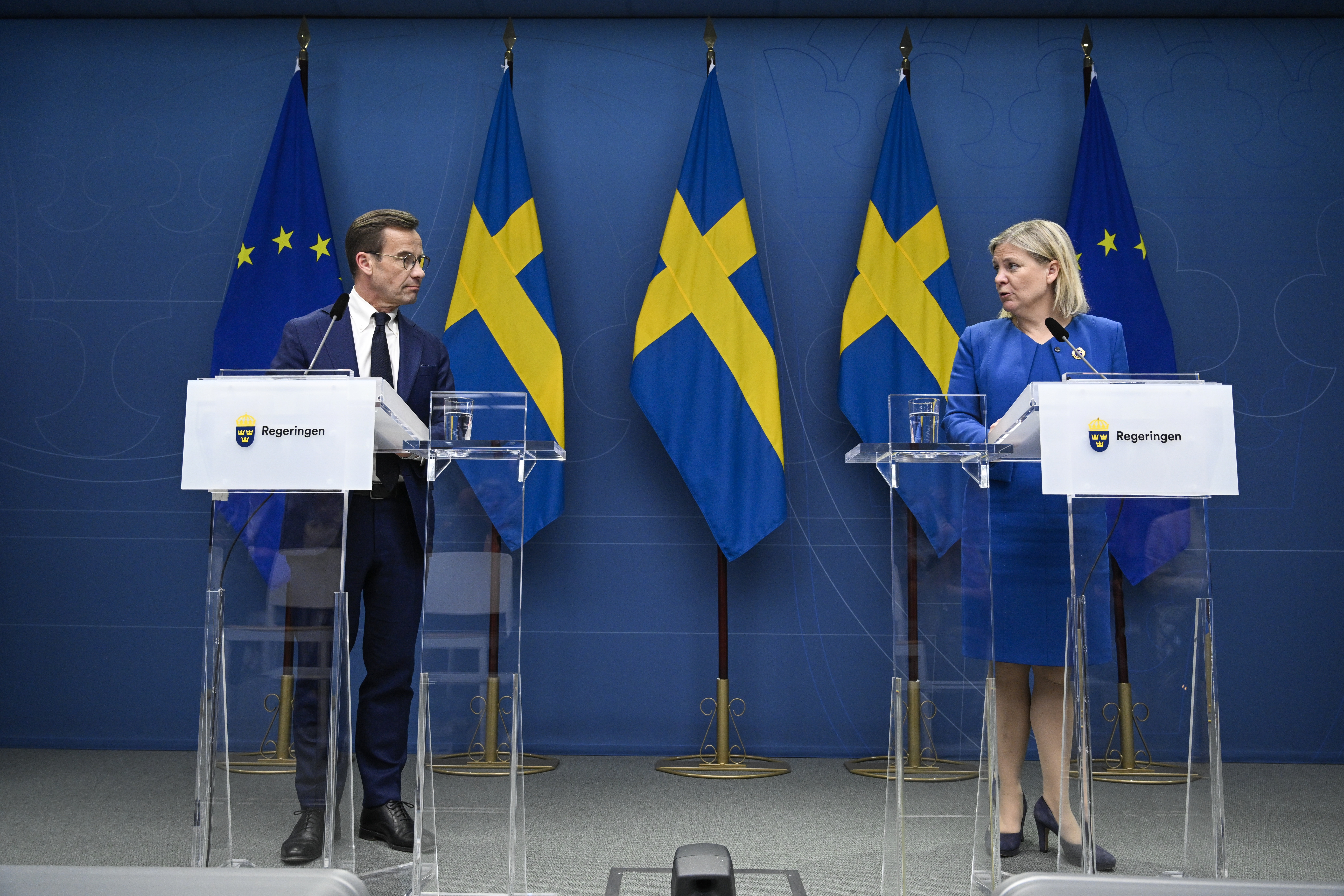NATO
Finland and Sweden on their way into NATO

Schwedens Ministerpräsidentin Magdalena Andersson und der Vorsitzende der Moderaten Partei Ulf Kristersson bei einer Pressekonferenz in Stockholm
© picture alliance / EPA | HENRIK MONTGOMERYLong thought unthinkable, the Finnish and Swedish governments have yesterday and today confirmed their country’s decisions to join NATO. The historic moves comes as a result of Russia’s war in Ukraine, which has had a significant impact on threat perceptions in the region. Reversing their long-standing policies of military non-alignment, both countries are now expected to submit a join membership application to NATO headquarters on Tuesday.
The decisions to join NATO represents a remarkable break from the past in both countries. As recently as early March this year, Swedish Prime Minister Magdalena Andersson (Social Democrats) still stated that a Swedish application for NATO membership was not relevant, as it could destabilise regional security. In similar comments, her Finnish counterpart Sanna Marin (also Social Democrats) in January said that NATO membership is "very unlikely" in her current term. But as Russia’s invasion of Ukraine continued, these positions became increasingly untenable.
Finland is aware of the threat posed by its eastern neighbour
In Finland, which shares a 1340-kilometer border with Russia, discussions on NATO membership started almost instantly after the Russia’s invasion. Finnish diplomats in Brussels started informal discussions with the defence alliance on 25 February, the day after the war started, and government officials have been on a diplomatic whirlwind tour ever since.
With a history of wars against the Soviet Union and having been part of the Russian empire for more than a century, Finland is acutely aware of the threat from its eastern neighbour. So when Putin’s Russia launched another unprovoked invasion of Ukraine as a sovereign democracy, Finland was left with no choice but to reconsider its alliance with the Western countries in NATO.
This sentiment is reflected in the Finnish public opinion. In the months following the invasion, support for NATO accession increased from 28% in January to a staggering 76% in May. The biggest political parties have in the meantime all followed suit. According to Anders Adlercreutz, the parliamentary leader of the liberal Swedish People's Party (SFP) that has long advocated for membership, this is a sign of a healthy political culture. “We rethink when the situation around us changes”, he said earlier this month, identifying the changed security situation as the main driver for the current push for NATO-membership.
The political momentum in Sweden for NATO accession has intensified
In Sweden, whose security policy has traditionally been strongly aligned with Finland’s, the political discussions soon followed suit. Sweden had previously stayed out the alliance to avoid isolating the Finns from the rest of the Western powers. However, with Finland changing its position, these reservations no longer applied. This forced Sweden to engage in a process of domestic discussion and again close external cooperation with Finland.
Contrary to the situation in Finland, however, the political momentum for NATO-accession has been building up steadily for some time already. Sweden’s traditional policy of military neutrality, which had been in place since the early 19th century, was dropped after the end of the Cold War and in 2009 Sweden entered into various mutual defence treaties with the EU and other Nordic countries. Rather than a sudden move, we should therefore see it as the culmination of a broader political shift that has taken place in the last decades.
Politically, the Swedish Liberal Party (Liberalerna) was first to support NATO-accession, following NATO’s military intervention in Kosovo in 1999. They were followed by the Moderats (2003, due to America’s Iraq War), and the liberal Centre Party and Christian Democrats (2015, after Russia’s first invasion of eastern Ukraine). With the far-right Sweden Democrats making a U-turn in early April, the governing Social Democrats were the only big party opposing accession. For them, the debates that followed the 24th of February proved to be the final push towards NATO.
Russia's invasion of Ukraine was a turning point
Over time, Finland and Sweden have already developed close relations with NATO and its members. As a NATO partner nation, their forces and weapons systems are already interoperable and they have contributed to several NATO missions, such as those in the Balkans, Afghanistan and Libya. As integrated allies, the next step is therefore mainly about the mutual security guarantee.
For this reason, Russia’s invasion of Ukraine was a watershed moment for our allies in the North. It offered a reality check that non-committal cooperation could really mean just that. In search of fixed security guarantees, they have now taken the decision to go all the way.
As two strong liberal democracies, Finland and Sweden fulfil already fulfil all requirements for NATO entry. On top of that, they will significantly enhance NATO’s ability to stand up against any future acts of aggression. Regionally they can be considered as security providers and with their accession; NATO would have a unified formation in the Nordics. It is therefore a clear win-win for all liberal democratic forces in the alliance and beyond.
